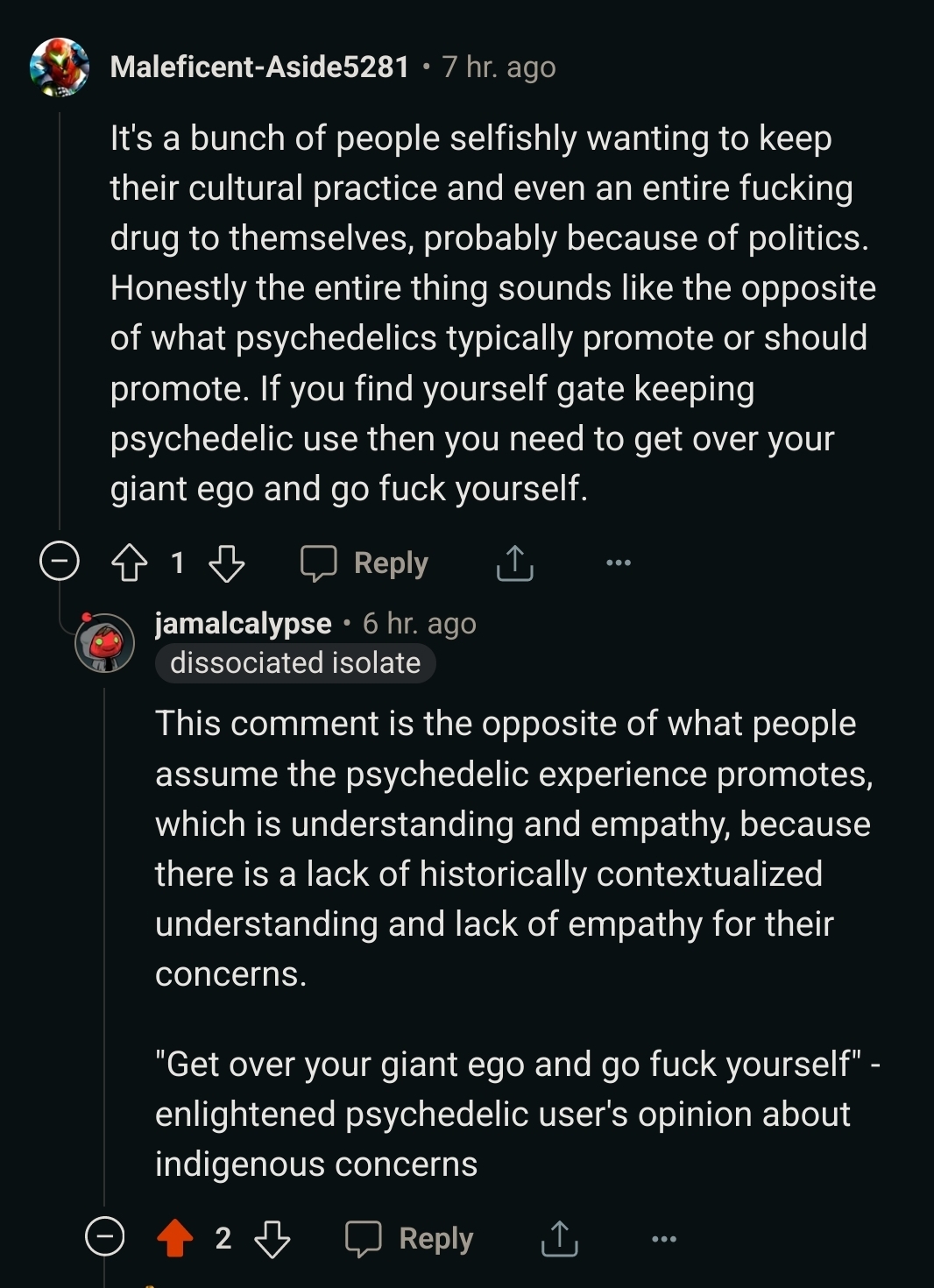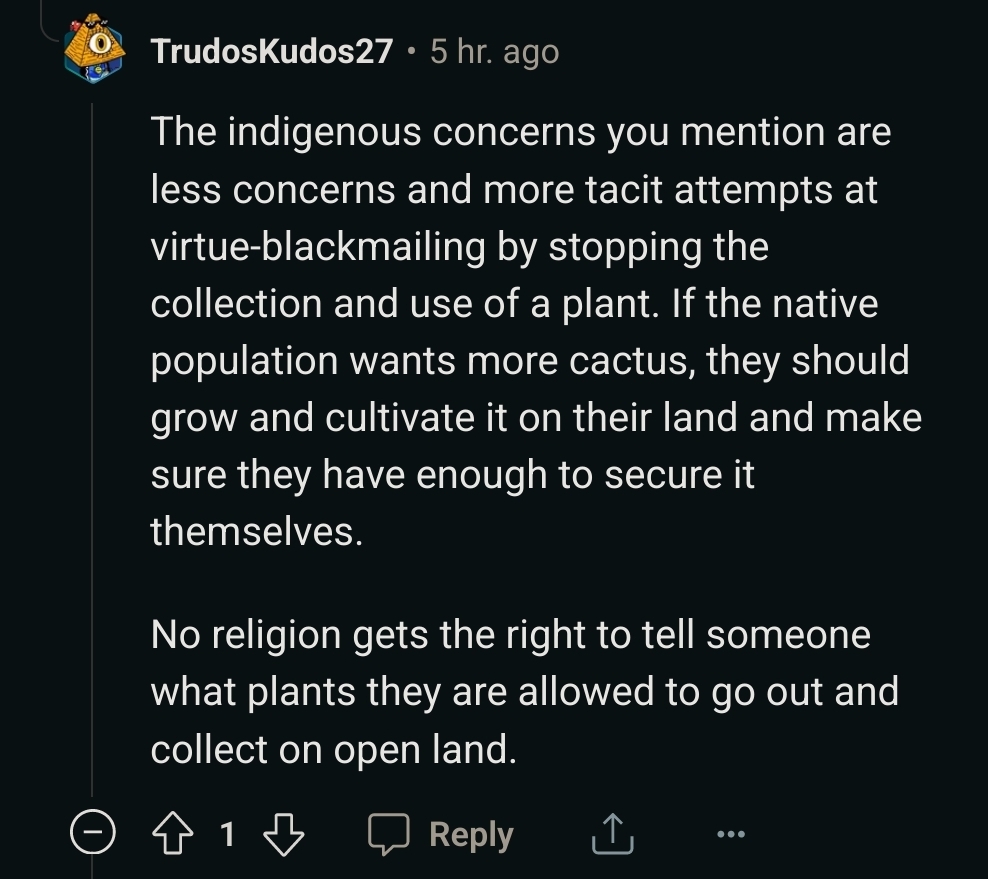

https://teddit.zaggy.nl/r/Psychonaut/comments/18mth6c/peyote_is_the_darling_of_the_psychedelics/
Honestly this whole thread is a cesspool, pure psychic damage. There are literally functional alternatives, but still these self-enlightened egolords can’t keep their fucking hands off an endangered plant. The prevailing attitude looks to be “Its there, so I i am entitled to plunder it”


I read the original article and the only thing I have against it is the anti-synthetic peyote stance they have. I get it’s a sacred plant but if the option is people foraging it to extinction or letting them have a lab grown version then just let them make it in the lab. As much as I support indigenous folks in their anti-crakkker stance they don’t have the right to the molecule itself especially if it isn’t derived from peyote.
I assume that’s the point of the first comment. Not “Let me forage this plant to extinction” but “If you say I can’t have a synthetic version and I can’t forage then what do you want me to do?” Just let them have the lab-grown stuff and keep the plants yourself. Less foraging, psych folks get their trips, everyone’s happy.
Yeah i re-read the article a few times and came to a similar conclusion. At the same time - if they have an issue with white colonizers using synthetic
Peyotemescaline, is that not also worth consideration and empathy? It subverts the supply issue, but it feels to me (as a white colonizer) like approptiation of someone’s culture, against the protest of the people who’s culture is being appropriated.Should we really be forcing onto any indigenous peoples our views of whats “fair”? There exist many alternatives to mescaline, and I think their desire to not have it commodified and shared should be respected.
Removed by mod
Its a thorny issue but I think youre way off the mark. It’s not about a molecule, it is about cultural “capital” built up over hundreds or thousands of years, and then that culture being taken apart, bit by bit, anything of value gets commodified and repackaged to colonizing people, alienating and severing it from its cultural significance, and anything else that can’t be made into a commodity is subsequently destroyed or otherwise alienated from as much of the past and the culture as possible. Its part of a process of domination. Youre basically making the same argument as the above dunk subject, that because this substance has been intentionally, forcefully and painfully alienated from its original cultural significance, that it is inherently alien. Shrouding this argument in the language of science doesn’t work either: in my opinion we should be suspect of the language of science and its seemingly disaffected and intellectually distanced, sanitizing affect. In this case, as in most cases, science is political.
Noone really teaches us the definitions of cultural appropriation and I don’t think that even most leftists have a solid formulation for it. So I don’t blame you but you’re making a big error here.
I use the term “capital” above because that’s what its become, due to the totalizing quality of capital, but the real cultural and historical significance is beyond my ability to comprehend. We have to trust the victims of erasure, otherwise we are just chuds
My dude, what? We’re talking about settlers appropriating the culture of indigenous Americans. I’m not versed in the history of the Chinese Tea trade, but it has historically been exported and shared. The key difference being “Exported and Shared”. Willfully sharing parts of your culture with other people is not at all comparable to having it be appropriated by colonizers despite your express protests.
Willow trees grow worldwide, and people generally use the resources that are available to them. There is definitely a case to be made about the imperialist nature of western medicine, but that is a completely separate conversation from what we’re talking about here.
Why are you so intent on determining what parts of their culture they have a right to and which parts they don’t?
seems real weird to say a microscopic chemical is part of a culture. Like we don’t buy chromosome arguments from transphobes because gender was established before we knew about them and before that cultural meaning could’ve existed.
deleted by creator
Appropriation isn’t a marxist criticism. Stop using it in this way if you’re going to keep saying it.
Can you help me understand what you mean, or point me in the right direction? I’m not exactly a well-read Marxist and I’m not trying to hide it
Appropriation is a value-neutral concept. And also not rooted in exploitation per se. There’s an erroneous conflation here between colonialist appropriation which does material harm to the people being colonized as well as possibly being a component to the ideology of colonialism (like Israel taking Palestinian culture into itself to use as a justification of their superiority to them) which marxism will sometimes talk about, versus neutral appropriation like white people using synthetic peyote or American teenagers making vaporwave from '80s J-Pop.
It’s not inherently disrespectful to use things without chaining ourselves to the original contexts they were used in. It can sometimes be harmful and/or disrespectful but idpol liberals literally only care about turning anti-imperialism and morality into arbitrary dinner etiquette. So they just call it all cultural appropriation and tell people not to do arbitrary things.
Good post!
I appreciate the response - I understand what you are saying. I do want to clarify that I’m not trying to argue from an arbitrary moral/idpol perspective. In the article in the linked thread, they interviewed a person who is a part of the Navajo nation, who argues explicitly against the consumption of Mescaline for outsiders, synthetic or not.
If I am understanding you correctly - that would shift this from being a purely value-neutral form of appropriation, to being actively harmful and disrespectful.
Does it? I kinda feel like you’re approaching the idea of listening to native voices uncritically. Protecting their practices and ability to practice their culture is important, but the idea that their religious beliefs about nonpractitioners should be enforced isn’t acceptable, just like it isn’t from any other religion.
Certainly we should be protecting peyote, returning the lands it grows on to the tribes/NAC, and stopping others from harvesting it, but there isn’t a justification for stopping people from using mescaline that was created sythetically or grown from other cultivated species. The theft and oppression that stops them from practicing their religion is harmful, but just using mescaline derived from other sources doesn’t affect them or their ability to practice.
I think some context is lost here, is the plant the culture, or the ritual surrounding the plant?
Catholicism uses wine in a ritual form in a very integral part of the religion, but wine itself is naturally occurring when you forget about your berries in the jar.
If these people were going around performing the entire native ritual in some commodified way, it’d be 1000x more horrifying than tech bros wanting to get loopy.
According the the person interviewed in the article, it is the plant, and the chemical itself.
There’s definitely a branch of “Psychonauts” that want to engage in the whole ritual practice (See all these psychedelic retreats/therapies/ayauasca “experiences”), but it sounds like many of them don’t want the chemical commodified at all either.
Edited because I think I misunderstood the argument you’re making. Apologies for being a big dummy.
I can absolutely see why commodifying mescaline or rituals associated with constitutes harmful appropriation of indigenous culture against their expressed desires, but I don’t see why synthesizing (or growing and extracting at home) a substance outside of the context of its traditional use, and using it privately is harmful. Obviously it’s done against the expressed preferences of a culture that has used the chemical for centuries+ but I’m encountering some trouble accepting the notion that a being colonized necessarily prioritizes one people’s spiritual belief over private drug use.
If this also completely misses the argument you’re making, I apologize.